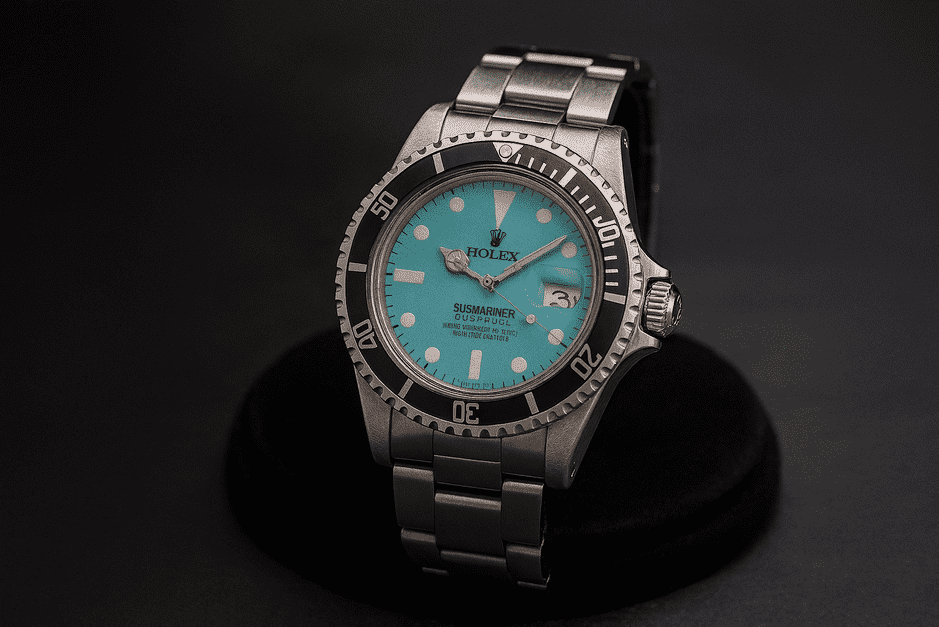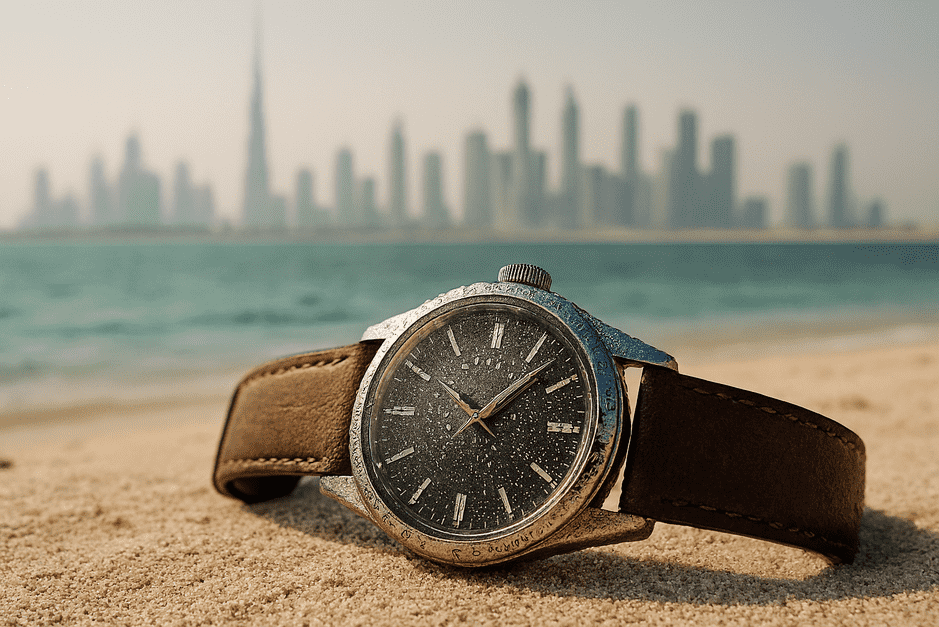In the late 1970s, a contestant on The Price is Right walked away with what looked like a simple door prize. Decades later, that very prize has resurfaced at Bob’s Watches — and it happens to be the Tiffany & Co. Rolex Submariner Ref. 1680. Known as one of the rarest vintage Rolex Submariners ever made, this piece combines Tiffany dual-signature branding, full provenance, and cultural significance.
The watch in question is a 1978 Rolex Submariner Ref. 1680, remembered as the first Submariner to include a date display. More importantly, this example stands out because of the Tiffany & Co. co-branding on the dial. Collectors value such dual-signed Rolexes for both rarity and cultural importance.
Why this Tiffany & Co. Submariner matters
- First Submariner model with a date window (Ref. 1680).
- Tiffany & Co. dual-signature, among the most desirable Rolex features.
- Provenance linked directly to a U.S. game show prize.
- Daily use by the original owner, adding authenticity to the story.
As Paul Altieri, CEO of Bob’s Watches, explained:
“It’s not just the rarity of the Tiffany dial, it’s the story. A game show prize became a cherished daily companion — and now, a world-class collector’s piece.”
Rolex collecting in numbers
Since 2010, Bob’s Watches has completed over 50,000 Rolex transactions. During the same period, Tiffany-signed Rolexes have increased in collector value by more than 35%. Furthermore, auction houses confirm record-breaking demand for dual-signed dials.
Q&A: Collectors want to know
Q: Why are Tiffany-signed Rolexes so valuable?
A: Dual-signed dials are rare because only a few retailers had this partnership. As a result, Tiffany-branded Rolexes enjoy even greater desirability.
Q: How can you authenticate a Tiffany Rolex?
A: Collectors should check correct serial ranges, dial printing consistency, and period-specific details. In addition, Bob’s Watches subjects each watch to strict authentication.
Q: What sets this Submariner apart from others?
A: Its unique story — a U.S. game show prize worn daily before entering the collector’s market. Consequently, it blends American pop culture with Rolex heritage.
Industry expertise and recognition
Bob’s Watches is widely known as the leading pre-owned Rolex marketplace in the United States. Through a transparent buy/sell model, rigorous authentication, and an educational approach, the company has built trust with new buyers and seasoned collectors alike.
Altieri added:
“We see ourselves as caretakers of history. Our responsibility is not only to authenticate and preserve but also to share the stories that make each Rolex unique.”
Suggested Reading:
If you’re interested in the history of Rolex co-branding, you can also explore the guide on Understanding Rolex Dial Variations.
For collectors focused on provenance, the article on How to Authenticate a Vintage Rolex provides a step-by-step approach.
And if you’re drawn to the cultural side, don’t miss the feature on Rolex Watches in American Pop Culture.
Introduction
This Responsible Travel FAQ provides comprehensive answers to help you make ethical tourism choices.
Our guide covers eco-friendly accommodations, local community support, sustainable transportation, cultural respect, wildlife ethics, and ways to reduce waste.
Following these practices ensures your adventures benefit both destinations and travelers.
What is Responsible Travel and Why Does It Matter?
Responsible travel means making conscious choices that minimize negative impact while maximizing benefits for local communities and the environment.
Tourism generates $1.4 trillion annually but produces 8% of global carbon emissions.
Your travel decisions affect local economies, cultural preservation, and environmental conservation.
How Do I Choose Sustainable Accommodations?
Look for eco-certifications such as:
- Green Key
- LEED building standards
- EarthCheck approval
- Rainforest Alliance verification
Check if hotels use renewable energy, water-saving systems, and source food locally.
Ask about waste reduction programs and community involvement. Calling properties directly helps verify claims.
Transportation Options for Responsible Travel
- Train travel emits 80% less carbon than flying for similar distances.
- Choose direct flights when necessary and book economy class.
- Use public transport, bicycles, or walk instead of renting cars.
- Consider verified carbon offsets for unavoidable flights.
Supporting Local Economies
- Buy from locally-owned businesses instead of chains.
- Book community-based tours with local guides.
- Eat at family-owned restaurants with local ingredients.
- Stay in homestays or boutique hotels rather than international chains.
- Purchase authentic handicrafts fairly from artisans.
Packing Tips for Responsible Travel
- Reusable water bottle with filtration
- Solid toiletries to reduce plastic
- Reef-safe mineral sunscreen
- Reusable shopping bags
- Bamboo or metal utensils
- Portable laundry soap
Pack light and choose durable, multipurpose items.
Respecting Local Cultures
- Learn cultural customs, dress codes, and etiquette.
- Learn basic local phrases.
- Dress appropriately for religious and conservative areas.
- Ask permission before photographing people.
- Participate respectfully in cultural activities.
Ethical Wildlife Encounters
- Maintain safe distances and avoid feeding animals.
- Choose conservation-focused sanctuaries, not entertainment attractions.
- Avoid elephant rides, direct contact, or photo opportunities with captive animals.
- Use certified naturalist guides who prioritize welfare and habitat protection.
Reducing Waste During Travel
- Use reusable containers, bags, and utensils.
- Refuse single-use plastics.
- Choose digital tickets and receipts.
- Carry a small trash bag where disposal is limited.
Questions to Ask Tour Operators
- Are staff local and fairly paid?
- How does your business give back to communities?
- What environmental practices are in place?
- Are group sizes limited to reduce pressure on sensitive areas?
- Are wildlife experiences ethical and conservation-focused?
Money and Overtourism Practices
- Use local ATMs and tip according to local customs.
- Support social enterprises and cooperatives.
- Visit during shoulder seasons, off-peak hours, or lesser-known areas.
- Stay longer in fewer destinations.
Responsible Travel on a Budget
- Cook using local market ingredients.
- Use public transportation.
- Stay in local hostels, guesthouses, or homestays.
- Explore free cultural events or walking tours.
- Exchange skills or volunteer for free accommodation.
Pre-Travel Research
- Learn about environmental challenges and cultural sensitivities.
- Check seasonal weather and political situations.
- Identify local organizations to support.
- Read destination-specific responsible travel guides.
Creating a Positive Impact Post-Travel
- Share authentic stories on social media.
- Write detailed reviews for responsible businesses.
- Continue supporting local organizations.
- Apply sustainable practices in daily life.
- Recommend responsible travel to others.
Learn more:



